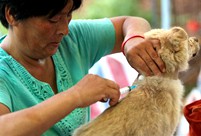

BEIJING, June 26 -- Some officials' addiction to superstition, including feng shui, is leading to reckless spending, perverse decision making and inefficiency, China's top discipline watchdog has said.
Some are even turning to corruption to buy good-luck charms and to have buildings oriented in ways held to be auspicious under the ancient Chinese philosophy of feng shui, warned the Central Commission for Discipline Inspection of the Communist Party of China (CPC) in a report released on Wednesday.
Superstition is officially banned by the CPC, but such beliefs are still prevalent. For example, floors in some official office buildings are numbered to skip four, 13 and 14, all numbers that many Chinese think of as unlucky.
Officials go to great lengths to arrange their offices according to feng shui principles, needlessly demolishing buildings when their positioning is disapproved of by feng shui consultants. Some buy expensive good-luck stones for their desks or change the names of regions under their jurisdiction to make them more auspicious, according to the report.
It added that this is generally done for the purpose of seeking personal wealth rather than improving the lives of local people.
Luo Fanglai, director of the Land Resources Bureau of Shuangfeng County in Hunan Province, spent 200,000 yuan (32,220 U.S. dollars) on a giant golden ball to place on top of an office building.
Wu Zhizhong, director of the legislative affairs office in Inner Mongolia Autonomous Region, was sentenced to life imprisonment in 2013 for bribe-taking and embezzlement of tens of millions of yuan. Law enforcers found Wu had a private collection of hundreds of Buddha statues, niches and portraits, according to the report.
Zhou Yongkang, China's former security chief, is believed to have spent vast sums on feng shui consultants and to have visited a fortune teller known as the "Sage of Xinjiang".
"These officials don't follow communist beliefs and are idle in serving the public, so absorbed are they in superstition and befriending cult masters," said Ge Jianxiong, a senior political advisor.
 4-year-old cute 'monk' spends summer holiday in temple
4-year-old cute 'monk' spends summer holiday in temple College graduates shining on the red carpet in Nanjing
College graduates shining on the red carpet in Nanjing PLA soldiers launch guided missiles in confrontation exercise
PLA soldiers launch guided missiles in confrontation exercise One woman’s fight against dog eaters
One woman’s fight against dog eaters Beautiful and smart - post-90s college teacher goes viral
Beautiful and smart - post-90s college teacher goes viral Top 10 luxury houses in the world
Top 10 luxury houses in the world  National Geographic: best photos during journey
National Geographic: best photos during journey Couples who engage in meaningful and deep conversations are happier
Couples who engage in meaningful and deep conversations are happier Maldives resort rated best hotel of 2015
Maldives resort rated best hotel of 2015  Global attitude poll reinforces old thinking
Global attitude poll reinforces old thinking Luxembourg scholar explodes myths about Tibet independence
Luxembourg scholar explodes myths about Tibet independence Smuggled meat came via Vietnam: official
Smuggled meat came via Vietnam: official Mentally ill confined at home due to lack of resources and public education
Mentally ill confined at home due to lack of resources and public educationDay|Week